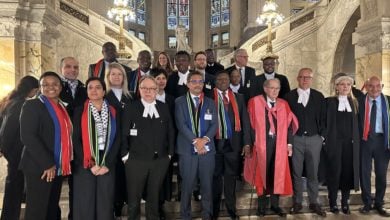On October 31, Turkish police raided the houses of Cumhuriyet newspaper’s editor-in-chief and a number of columnists. Cumhuriyet is a secular opposition newspaper that dates back to 1924, one year after the foundation of the Republic and is historically linked to the secular, Kemalist founding cadre of the Republic. Cumhuriyet literally means “Republic” in Turkish.
According to local media, at least 13 Cumhuriyet journalists and administrators were detained, including editor-in-chief Murat Sabuncu, executive board chairman Akın Atalay, and a number of writers such as long time columnist Hikmet Çetinkaya and cartoonist Musa Kart. Kart had earlier been taken to court twice by President Tayyip Erdoğan for “insult and slander,” fined 5000 Turkish Lira as a result of the first trial in 2005 and acquitted of the second one in 2014 where he faced a jail sentence of nine years.
Cumhuriyet journalists and administrators are charged with having ties to Gülenists as well as the outlawed Kurdistan Workers’ Party (PKK). A statement released by the İstanbul Chief Prosecutor’s office claimed:
“… some executives of the Cumhuriyet had been sponsoring PKK, FETÖ/PYD (Gülenist Terrorist Organization/Parallel State Organization) and they had been producing articles justifying the coup of July 15.”
In addition to the detentions, an arrest order has also been issued for Can Dündar, the paper’s former editor-in-chief, who is out of the country at the moment. Dündar had earlier been detained and spent three months in jail in 2015 after having published a report exposing the ties between the ruling Justice and Development Party (AKP) and the so-called Islamic State, pointing to evidence of Turkish Intelligence agency supplying arms to IS fighters. Dündar is facing six years in prison.
The day after the detentions, Cumhuriyet had the headline “We will not surrender.” A statement released by Cumhuriyet said:
“Since the first issue of our paper published on May 7, 1924, Cumhuriyet has continued to be published with the aim of establishing of a genuine democracy in Turkey.
[…]“It is a newspaper that walks in the ‘enlightenment’ path of the Republic as laid by (Mustafa Kemal) Atatürk’s revolution and its principles. It upholds reason against bigotry, independence of science from religion and the adoption of secularism by the whole society.
[…]“As our paper has never given up its struggle, whether during the previous coups, as it has fought against the Fethullah Gülenist prosecutors and judges and the forces behind them, it still has the determination and power to resist any form of oppression today as well, no matter where it is stemming from.”
Basın-İş, the union of journalists and one of the five founding unions of DİSK (The Confederation of Revolutionary Unions of Turkey), denounced the raids on Cumhuriyet and said:
“The state of emergency declared using the attempted coup as an excuse is a tool for AKP to suppress the opposition as a whole. The ruling party cannot tolerate any voice of opposition.”
In an earlier statement published on Liberation, we had written:
“The Gülen movement had been an important ally of the ruling AKP government between the time it came to power in 2002 until 2013. They have colluded with the AKP, held important positions in the state apparatus and exercised influence through a vast network of media and educational institutions.
“The basis of their unity with their former partners in the AKP was a shared desire to destroy the 1923 secular republic and replace it with a religiously-oriented state that rolls back democratic rights.
“As the AKP reoriented the nature of the state, it eliminated most of the followers of the progressive secular “Kemalist” tradition – named after the founder of the Republic of Turkey, Mustafa Kemal Atatürk – from the judiciary, state security, public education and even sections of military. This vacuum was filled in many cases by Gülenist cadre.”
AKP has used the resulting conditions of the failed-coup to its benefit to the fullest extent and instituted its own reactionary coup. Since July 15, more than 37,000 people have been arrested. Over 100,000 public officials, judges, prosecutors and others have been sacked in a ruthless crackdown, under the pretext of purging Gülenists from the state. Using the state of emergency declared following the coup, Erdoğan and his AKP sidelined the Parliament and Constitutional court. The country is now being ruled by statutory decrees, essentially an undeclared dictatorship.
Unfortunately, the ambivalent post-coup positions held by some opposition parties within the bourgeois parliamentary system have also helped smooth the path for AKP’s escalation of repression. It is important to unequivocally expose AKP as the main partner in crime with the Gülenists in destroying all progressive achievements of the 1923 Republic and replacing it with a reactionary, semi-dictatiorial regime.
The center-left secular Republican People’s Party (CHP) on July 24 in İstanbul even went so far as to organize a “Democracy Festival” attended by thousands, including representatives of the ruling AKP and the fascist MHP.
As the defender of ‘democracy’, AKP turned its post-coup operations into a broader witch-hunt, targeting any progressive force opposing its repressive, religious rule under President Erdoğan. The wave of purges that started with Gülenists is now knocking at the doors of the secular Kemalists forces, the Kurdish movement and socialists with a renewed fervor. 15 media outlets, including Dicle News Agency (DİHA), the Kurdish-language daily Azadiya Welat and Evrensel Kültür Magazine were shut down over alleged ties to the outlawed PKK.
Elected public officials such as mayors have also come under fire. Under the guise of figting terror, AKP replaced 28 mayors with “alleged ties to terror organizations” with appointed trustees. Of those 28 mayors, 24 belonged to the main Kurdish opposition party HDP charged with ties to PKK while only 4 were charged with links to the Gülenist movement.
Supported by the right-wing MHP (Nationalist Movement Party), AKP is now in a much stronger position to push for the constitutional change for “executive presidency,” which would give the President executive powers, constitutionally legalizing Erdoğan’s corrupt, brutal dictatorship already in place.
Not lacking his dark humor even while he was being detained, the cartoonist of Cumhuriyet, Musa Kart, most aptly portrayed what “executive presidency” really means:
“The detention of a cartoonist is the official proclamation of the ‘executive presidency’. Good luck to everyone with Tayyip Erdoğan’s new ‘presidency.’”
The Party for Socialism and Liberation stands in solidarity with all the progressive forces in Turkey who are facing an existential threat at the hands of the right-wing, reactionary AKP regime.
AKP hands off Turkey!






